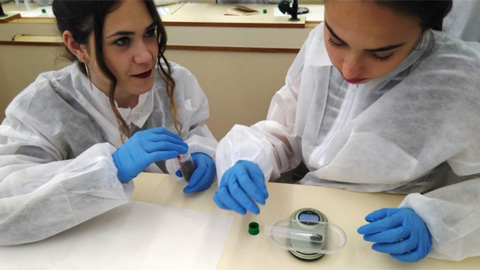UAB students and secondary school centres work together to find new antibiotics

24/04/2018
As part of a learning-service and teaching innovation project, fifteen lecturers from the Department of Genetics and Microbiology and the Department of Animal Health and Anatomy at the UAB campus, coordinated by Professor Montserrat Llagostera, have been working with a total of 55 students from the degrees in Microbiology, Biotechnology, Biology, Biomedical Sciences, Genetics, Biochemistry, Veterinary Medicine and Food Science and Technology. The objective was to prepare laboratory experiments to be conducted with secondary school students in fifteen different centres in which bacteria would be studied to produce new antibiotics.
The action is part of a participative project entitled Small World Initiative, an international initiative by the University of Yale (USA) with over 12 countries adhered to the project. It is aimed at the education community with the objective of fostering scientific interest based on the exploration of microbial diversity and the search for micro-organisms to use in new antibiotics. The project aims to improve the information and awareness of the severe problem of antibiotic resistant bacteria.
UAB lecturing staff has been working in the past few months with degree students on the key fundamental concepts of this project, such as resistance to antibiotics, in addition to showing them the steps to create an experiment at schools, the compulsory rules of biosecurity set down by the international SWI project, and debates on all these aspects. The degree students participating also received training in the importance of learning-service, responsible research and innovation (RRI) and intellectual property and its protection.
Throughout the project, students will be travelling together with lecturers to 15 different centres to show students how to conduct experiments with the aim of isolating bacteria which can produce antibiotics. The best of these bacteria isolated by students will form part of a UAB collection which will be available to any researcher interested in studying them.
The SWI project at the UAB forms part of the Argó Programme directed by the Institute of Education Studies and receives support from the Teaching and Dissemination of Microbiology Group of the Spanish Microbiology Associaation and the CESIRE-CEDEC of the Government of Catalonia's Department of Education.